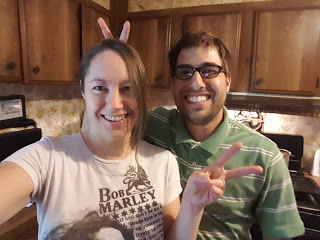Tsara Shelton's Blog, page 10
January 20, 2021
Autism Answer: Beautiful, I Feel Ugly Today
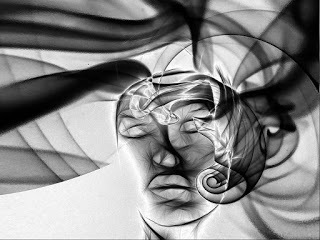
Most of us have had those days, right? Our hair is flat or falling in a way we don't like, our skin has pimples or unappealing hairs in awkward places or too much flaky dryness or we noticed our teeth look particularly yellow, our bodies are bigger or smaller than we like and our clothes refuse to flatter us choosing instead to rebelliously call attention to the parts we are trying not to give attention to while doing their best to be a color that looks terrible on us, even if it looked good just two days ago. You know what I mean? Those days when we feel like being quiet and unseen and hopefully a shower and good nights sleep and a brand new outfit will make all the difference tomorrow. (Please say you know what I mean. It's not that I hope you also have days where you feel ugly, but I do hope I'm not so awkward and self-centered and silly that I'm the only one! tee hee!) Now, think about those days. (Those of you that have them, and if none of you do well, um, I was just kidding? Giggle!) When you feel ugly, sort of hide, put your hand on offending blemishes and hairs, avoid standing out or apologize more than usual. These are days when we aren't actually ugly, just less physically falling together than other days. And yet much of our manner changes. And when these days last, more of our manner changes. Maybe we skip out on opportunities, putting them off till we look better. And our self-talk is influenced by our appearance, so on days we feel ugly we tend to tell ourselves we are ugly. Even though we aren't. Even if our outward appearance is not typically attractive, we are not ugly because of it. But when we feel ugly, we can begin to think we are ugly, and - sadly - sometimes we will treat ourselves and others around us in an ugly fashion. Having days when we feel ugly is no big deal. Hardly worth bringing up. (And yet here we are. Here I go again. I love talking about nothing like it's something! It's my superpower.) But if days when we feel ugly can affect our choices, movements, and self-talk in these hardly worth talking about ways, imagine what feeling ugly every day can do? How integral to our self-talk and habits and even to our kindness it can be. When I was a teenager I felt certain that I was an ugly person. I worked my butt off to try and prove otherwise but was lost to know who I was trying to prove it to. I had no clue what the proof could possibly be but I wanted for it. I was cruel to myself and cruel to people closest to me. I didn't know it at the time, how cruel I was being. Well I knew some of it but not all of it. Then I spent a whole lot of years trying to put myself back together. To see myself as not an ugly person. Maybe instead as a beautiful one. We can't force people to believe they are not ugly. We can't make them know that - regardless of physical appearances - ugly is not something you are but someone you become. However, I honestly believe we can create an environment that encourages us to believe that. My youngest brother asks me what I think of his appearance often. He asks if I think he's handsome, if I think he looks young, if I think he looks cool. I always answer honestly (which is: yes he's a handsome fella!) and we always end up talking about the truth that most people who are willing to be decent to us and spend thoughtful time with us look good to us. And how we should probably remember to be decent to ourselves and spend thoughtful time with ourselves in order to look good to ourselves. And I confess, when we've had these chats he tends to shine and look particularly physically handsome at the end of them. Smiling authentically and walking with his head up, he looks good. I think partly because he's feeling good. And all we did was spend some focused thoughtful time together. So when I have a day where I'm feeling ugly, I remember that it is not nothing. That I should be careful and kind with myself and not become ugly. Sure, I still try to stay in the background a bit and cover my chin hairs with my hand, but I also try to do what I can (like pluck those pesky chin hairs*) and work at not to being ugly to myself about who I am and how I look.
I remind myself of how handsome my baby brother looks when he walks away feeling comfortable and confident. I try to do that too.
And if I see an opportunity to do so, I try to reach out and be beautiful to someone. Helpful or available to listen.
So if you or a loved one has one of those days when you feel ugly, that's beautiful. It's an opportunity to notice how you are affected and know that others around you might sometimes be making choices for similar reasons, so give them a little room to have an off day. Consider the challenge faced by people who are treated poorly, abused, pitied, and bullied because they are seen as physically ugly and make darn sure not to do that to anyone. It's uncomfortable enough to feel ugly, which most of us sometimes do I think. But to pile ugly treatment onto that is unnecessary (seriously, how does that help anyone?) and creates a thick layer of mean-fog that slows us from shining our brightest.
Maybe even, on a day where you feel ugly, appreciate that you are only having a day where you feel ugly rather than months or years. And try to keep it that way.
There is so much going on in the world - like, seriously, the list is endless! Having a day where we feel ugly is not important. But it's not not important either. Because we are important. And we can be beautiful. Everyday, even when we feel ugly. As long as we don't allow ourselves to become ugly. (If you read this and have never had a day where you feel ugly and it ends up affecting the way you behave then please feel free to comment with your secrets! Also, if nobody knows what I'm talking about that's because I made it all up and I'm totally kidding! ;D) Happy Wednesday, friends!!Here's to being beautiful even when we feel ugly! *Raising my coffee mug* Hugs, smiles, and love!!Autism Answers with Tsara Shelton (Facebook)
*I am aware that chin hairs are not inherently ugly. I just don't like how they look or feel on me. So distracting! I spend half my time pulling at them with my fingers. But if you have them and are rocking them, that's fantastic! My example was a personal one. Also, here is a pic of me plucking my chin hairs. Also, why do I have a picture of me plucking my chin hairs? I'm weird.
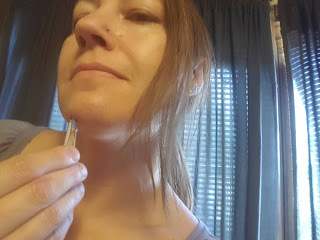
January 10, 2021
Autism Answer: Why We Revolt: A Patient Revolution for Careful and Kind Care - Book Review
*I originally wrote this review for Disabled-World.com. I highly recommend visiting the site and reading the valuable and eclectic content published there!
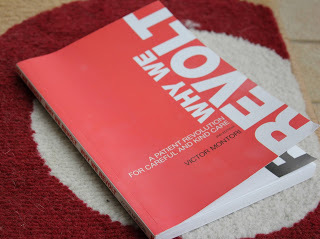
When I was a little girl and my mom complained about the lack of kind care she or my brothers were offered, despite my mom's excitement at collaborating and sharing ideas with experts in the field of disability, I thoughtlessly assumed my mom was expecting too much from people. I also wondered if people like my brothers could even tell when they were being treated with kind care.
I, clearly, was not good at kind care.
Over time, with my mom's insistence and persistent modelling, I became better at it. I also began to see the lack of it offered elsewhere. And once I saw it, I couldn't stop seeing it.
For those without a mother or brothers like my own, Why We Revolt: A Patient Revolution for Careful and Kind Care by Victor Montori can play the role of insistent friend that persistently models what kind care is, how we can and why we should require it for ourselves and our society.
Why We Revolt is an urgent book with a relaxed and poetic pace. It think this sets the tone for how we must revolt; with urgency that understands kind care is often relaxed and poetic. It is collaborative and creative. It is challenging and exciting. It can save lives and it does create better living.
The author, Victor Montori, MD, Msc, is a professor of medicine and a diabetes doctor at Mayo Clinic. His desire for kind care in all fields of healthcare shines through in the stories and essays throughout the book. But because diabetes is so often a lifelong disease, necessitating that care, medicating, and maintaining health become a lifestyle for diabetics, it is often through these stories that we feel the full impact if how careful and kind care can deeply affect our world.
The book is a collection of moving essays, written from personal experience within the confines of industrialized healthcare. Regardless of where you live in the world, of where you deliver or receive your care, the corruption of contemporary healthcare is affecting you. With compassion and passion, Montori shares how working within the confines has made giving careful kind care a challenge for him, personally. He exposes ways our streamlined healthcare, meant for patients like yourather than you, is disconnecting us from caring. It is hurting our ability to become holistically healthy. However, one of the things I loved about reading Why We Revolt, is Montori builds every story around a vision of – and belief in – effective and kind care.
For a book that consistently reveals and reminds us of the harm being caused in healthcare systems around the world right this moment, it is surprisingly lovely to read. Rather than display anger and provoke readers to feel hate and blame, it excites us with possibilities and envisions a different system that is built of love for humanity and honest science. This book is careful and kind itself.
Why We Revolt explains with clarity so much of what is wrong with healthcare today, putting clear words to what most of us suspect even when we can't clearly state it. Through the stories and insights, it connects us; caregivers and care receivers – reminding us to fan the flame of noticing each other in order to know how to help each other.
This book reminded me of growing up with my mother. Of how over and over she hoped for creative care when reaching out to professionals, particularly in the case of my brothers who had autism and other various cognitive challenges. How she would attempt to shed skepticism from past professional encounters and meet each new caregiver with a fresh attitude. And how over and over they would be unable or unwilling to offer themselves in a human capacity. To notice my mom and my brothers as individuals and collaborate in order to create individual protocols and regimens.
One passage in particular stood out and reminded me of how my mom decided to run her own clinic. Dr. Montori writes: “There is no natural law that commands corporations of any kind to place the interests of their stockholders and administrators first. A more natural law would state that if you meet or exceed the needs of your customers, if you respect the people you serve, if you don't lie to them or shortchange them in the quality of your offerings, and if you don't extort them, their loyal business will follow.”
My mom is an international brain changeand behaviour expert so her clients, eventually, do not need her anymore. Their loyal business manifests as word-of-mouth recommendations and invitations for her to speak, but the point is the same. Give quality, kind, careful care and your healthcare business will thrive because a healthcare business is thriving when it is offering quality, kind, careful care.
“Time is not money. The depths of time are the currency for caring.” ~Victor Montori
Why We Revolt is a book that belongs in every personal library. It can be devoured in a sitting or two, and continually referred to when the reader wants a reminder of how and why we must revolt.
_______________________________
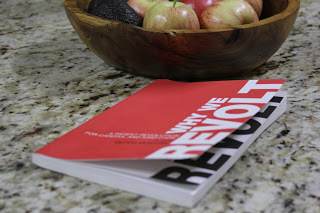
Why We Revolt: A Patient Revolution for Careful and Kind Care (2nd Edition) on Amazon.com: Why We Revolt
January 4, 2021
Autism Answer: Envision Clearly and Keep Moving in the New Year

"The universe constantly and obediently answers to our conceptions; whether we travel fast or slow, the track is laid for us. Let us spend our lives in conceiving then." ~Henry David Thoreau
I don't know about you, but for me and my family 2020 was a strange year. Actually, for my friends as well. And for my friend's friends. Hmmmm... maybe it's something in the air. ;D
In all sincerity, though, I send my love to everyone. Many of us have lost loved ones in this pandemic, in various ways. Losing someone is always emotional. Whether that loss was our choice or not, whether it was a loss we would do anything to undo or one we courageously insisted on, whether it was letting go so someone could become more of themselves or pushing away to become more of ourselves, it is always emotional.
This has been a year of change for almost all of us. Work, school, relationships, grocery shopping - everything is done differently now. Some things drastically so, some things only slightly. And we are required to find balance, shift our feet, make choices and form opinions about things we've barely considered of note in the past.
I know that my family has worked hard at using this time well. At finding this forced-upon-us moment at our doorsteps and trying our darnedest to turn it into an opportunity to strengthen what needed strengthening and let go of what needed letting go of and pushing toward almost entirely new visions of and for ourselves.
I also know that for all of us, every single one of us, it has been undeniably emotional while being simultaneously scary and exhilarating. Everyone in my family, every one of my friends, we are all being pushed to make changes and we are choosing to make the changes we were often either too scared or satisfied to make.
It's wild, really. Practically everyone I care about is in a state of almost. Precariously perched at the entrance of entirely different styles of living, staring into an unfinished picture of what they are hoping to accomplish; ingredients and ideas and hopes are floating before us in an abyss of possibilities and while we reach out for help and support from each other we are also on our own. The shifts of who leans on who and how we all lean on each other is leaving us a little bit dizzy. Where we are now would have been incomprehensible only one year ago, and yet here we are. Entirely real and in a state of almost. *
*I want badly to get specific here, to share with you all the ways in which my family is shifting. Moving to new places, living with new people, changing careers or looking for work after being in a dream job that felt permanent, losing homes and leaving people behind. I want badly to tell you the hopes we hold in these shifts. New found confidence and happiness, independence for those who only dipped a toe in, discovering what love is and all it might have to offer. But, as I mentioned, we are all in a state of almost. And so, for now, I hope you'll accept my vagueness as being purposely inclusive. Because, it is. The entire planet feels on the brink of almost and we are scrambling to make the best of it. We hope to build new systems where old ones were harmful. And in most homes there are personal hopes at the surface that were being stifled or avoided. And around the world people - forced as we are to do things differently - are seeing things in new light and making big changes. So, I think, you get what I'm saying even when I'm not being specific.*
So my resolution this year is to envision clearly and keep moving. To not try only for the easy life but for the best one, the one that cares about me, my world, and the people in it. I hope to help my loved ones do the same. I'm going to do my best to find balance regarding the timeline - no need to push forward so fast we push past possibilities. But let's not move at such a leisurely pace we lose this momentum. Let's not risk losing sight of the things we want to change, the things we were settling for and unhappy about - or simply the opportunities we were avoiding - before this pandemic began.
Confession: This is more work and takes longer than I want to admit. I love to talk about how everything is awesome and when we tell ourselves our stories with happiness and joy we will feel that happiness and joy. I think that's true. But I also think it helps to hold up a big hefty book once in a while to remind ourselves that big stories are long.
Big stories, colored-in with little stories of varying shades, when crafted carefully are truly one of the most sublime things made by humanity.
So with that in mind: Envision clearly and keep moving. Envision with kindness and intention and keep moving toward that vision.
That's what I resolve to do this year. And for however long it takes. Hugs, smiles, and love!!!!Autism Answers with Tsara Shelton (Facebook)December 8, 2020
Autism Answer: Disablity in Erotica

Disclaimer: I do not read, write, listen to, or watch erotica. Often.
I am, however, living in this world so I do stumble across it. And I am a sexual woman who's had reactions that tickle and sometimes ignite certain senses, usually unexpectedly and with a blush of titillation and surprise.
Sometimes, admittedly, I've looked furtively and cautiously around to check the absolute status of my privacy and have allowed that titillation to mature into the commanding pleasure it hints at, and we've worked together to grow that potential into promise. But, usually, I giggle and tickle and walk away.
Yet, even without any immersion or innate interest in erotica, I have noticed a couple things.
Firstly, I am affected by it. Not only in the moment of meeting it, but in my moments of intimacy – both alone and with a partner – as well. In my mind I've played images I've seen, read or heard about. I've imagined I look different, more like the desirable women described or pictured. I've hoped I was making the right sounds and movements so my partner would be as pleased as he would be if having an encounter with women in stories and sexy films.
Secondly, I don't see a lot of variety. Sure, there are smaller, bigger, a few different colours and a sampling of different preferences. If you're looking for taboo encounters between able-bodied fairly attractive not too old adults, I dare you to avoid it for any real length of time. As I mentioned, I don't seek erotica or porn, but it happens to me. (To be clear: I don't mostly mind.)
These two things are different issues that might have one solution. The way I'm affected by erotica is personal, I know that. I have my own insecurities and interpretations. Also, I don't actually watch, read, or listen to much erotica so I'm limited in how I understand it. But still, I feel confident that if there were more variety, more types of bodies and the inclusion of sensory challenges creating stories that illuminate needs we often think are limited to us alone, that leave us out of the sexy narrative – more of us would feel comfortable sexually. When we cannot see ourselves in these erotic scenarios that bring millions of people to websites and channels around the world, it most often plants the feeling that we are not desirable or worth the work.
I am not an expert, obviously, in erotica, porn, or the culture of it. I have admitted more than once already that I don't seek it and rarely take the time to enjoy it. Yet I know it's a real issue. Because, clearly, if I want to see disability represented graciously in erotica it's clear I'd have to work to find it. And according to disabled friends, I'd have to work especially hard to find erotica that stars disabled roles exhibiting agency and desire rather than just as a fetish or novelty.
I am a straight, able-bodied, unremarkable looking white woman in her 40s. It's not a challenge to see myself represented, and yet even I struggle to feel desirable and intuitive in the bedroom. Again, this is common but personal. Yet I truly believe it would be easier for me to feel free to explore my personal sexual side if there was more variety in the representation of sex, desirability, and bedroom moves.
A part of my personal issue has to do with how almost like the sexy ladies in literature and on screen I am. The seed has been planted that if I try I can be like them. And because they are the ones people seem to want to see, well, clearly I ought to give it a go. (It's tempting to add a few paragraphs about how I don't like being seen because I'm shy, and how it's important that we don't sculpt ourselves into something to be seen but rather create ourselves based on who we are and who we are proud of being, but that takes us too far away from the truth that these are common things to remind ourselves of because we're contending with a common desire to be seek-ed and seen. Even the shy among us.)
Interestingly, I often feel more deeply understood and comfortable with my vulnerabilities when I read, watch, or listen to something written by someone drastically different from myself. Someone with disabilities, a boy deciding what it is to be a man, someone growing up in a vastly different culture than my own, these are a few examples of protagonists who have illuminated me to myself. By having such unique experiences from my own they are able to reveal things in ways I was too close-in to realize.
Less surprisingly, they have helped me see people other than myself clearer, too. They have helped me notice others differently. They have helped me understand my brothers (my mom adopted four boys with autism and various other diagnosis) when they want to talk to me, their big sister, about the unique challenges they face, and interests they have, in the world of romance and sex. By representing themselves and the way they experience the world, they have given me the gift of seeing and of trying to understand.
They have given me a feeling of kinship with, and interest in, differences.
If I saw more of that in stories about sex and sexuality, I couldn't help but be more comfortable exploring my own differences. My own uniqueness. My own desires and pleasure points. I'd be more comfortable asking for and seeking my partner's uniqueness, desires, and pleasure points. I'd probably be better at recognizing them, too.
The only way to authentically shift the genre of erotica into a more diverse and inclusive place is to include diverse artists. My guess is these artists are more likely to create erotic art when they see themselves represented in it.
Luckily, there are always a few outliers and brave creatives doing what needs to be done.
So for those of you that seek and see erotica, those of you who like to listen to or read sexy stories, I hope you'll take the extra time to find something different. Something that explores a body you are unused to seeing. Not every time, of course. But now and then.
Perhaps you'll find something surprisingly sexy! And even if that isn't your experience, at least you'll know you're giving some – ahem – exposure to people who are publicly exploring their intimate selves in hopes of being experienced.
____
November 26, 2020
Autism Answer: I'm Thankful My Best Friend Is (Still) Alive

I'm thankful for my best friend. And I'm thankful she's still alive. My best friend and her husband were hospitalized and fighting for their lives this past summer. COVID-19 positive and in the ICU (one blessing, they were together) they were in pain, struggling to breathe, and having intense conversations about their possible death: What should we do for the kids before we die? Why have we not told them so many of the things they need to know? Not so much about our love for them (my friend and her husband talk openly and often with their children about their love) but about logistics and specifics and what to do with unfinished business. My friend is a nurse and until that time I hadn't really thought about the part of her job that puts herself and her family at risk for the health of others. I mean, I had sort of thought about it, but I hadn't felt about it. While they were fighting to breathe I was thinking and feeling about it. And after they were permitted to go home, doing better and no longer contagious but still needing oxygen machines and working at getting stronger without pushing too hard, I visited and we talked and talked about it. And about why it is worth it to her. (We also talked about fun light hearted stuff, laughed a lot, ate fun foods, and danced in her living room to our favorite playlists. After all, we believe in a holistic healing approach.) First responders and health professionals are walking into danger in order to help us out of it. This we all know, but it is worth it to take time to feel it too. And to listen to them when they take a moment to tell us what we might be able to do to help them. When I talk now with my friend she just wishes we would be willing to gather in small groups and wear masks when we go out. She knows it's not fun, but she and her coworkers are exhausted, forced consistently to turn people away when they're sick (there are not enough nurses and doctors, and there's not enough space in her hospital) and they are getting sick themselves, so are their loved ones. At the moment my friend's mom and sister and niece are all COVID-19 positive. They can't taste things, they're aching and sick and have a hard time moving around, but they're doing alright. No need for the hospital. It's been a couple of weeks and though they are barely better they are not worse, and that's a big thing. My friend's mom works with someone who tested positive for COVID-19 yet refused to wear a mask so it's likely that's where the illness spread from. But, of course, it could have been so many other sources. And this morning, around two in the morning, my friend got a text from her son - "sorry mom I can't make it to the house for Thanksgiving because I have a fever and I feel sick." My friend called to talk with me about it on her way to work where she offered to pull half a shift because they need nurses. They are always needing more nurses now. More people to walk into the risks in hopes that they can bring us out. She offered to do only half a shift because her husband will be home today. He's rarely home, though they don't complain about that. He was at risk of losing his work when this pandemic started but then after he had COVID-19 and didn't fully recover it was an absolute. Luckily, he found work in trucking and - though he is rarely home and making far less money - he knows to be grateful. In fact, their youngest son is still unable to find work. He was doing welding work (on pipelines, I think?) but he's been without work for over six months now and has not given up actively looking. He's had a great attitude, and that's awesome, but he still doesn't have a job. Now my friend is going to chat with her husband about keeping everyone away from their home this Thanksgiving. You see, her son is sick with COVID-19 symptoms and he lives with his brother. Who had a visit with their other brother just yesterday. Soooooo.... all the boys have been in contact with each other and though it is quite possibly just a flu or other illness, they are aware it also might be COVID-19. And my friend is uncertain whether she and her husband still have the antibodies, so she wants to be extra careful. Even though asking her kids to not come over for Thanksgiving sucks and hurts her heart and is unfair to her husband who rarely sees them. Even so, that's where she's leaning. Just in case it isn't just a flu. A problem with COVID-19 is if you do contract it, experts are still unsure how to help you. If you get the flu they know what to do. You're unlikely to die from the flu if you get help on time and are relatively healthy. But COVID-19 just isn't like that. It's still leaving nurses like my friend and her colleagues feeling impotent and uncertain and, of course, exhausted. They care about their patients and they care about their families and they care about their jobs and they care about their skills in treating illness. They care. I'm so thankful for my friend. For what she does at work, for what she does for her family, and for what she does for me. I'm grateful that she shares her work, her family, her time and ideas with me. She doesn't ask for much, but she does wish we'd wear our masks and do whatever we can to slow the spread of COVID-19. Smaller gatherings, being willing to shift our traditions to accommodate this new threat, being a brave lone mask wearer, or saying no to invites when we must. She knows it won't stop us from spreading COVID-19 but she also believes it will slow the spread. She's just one nurse with one voice. But that voice almost died, has nursed her husband when he almost died, has visited her mother and sister and niece (all geared up in PPE of course) to offer support and check their vitals, is going to talk to her kids about not coming to the house for Thanksgiving because she believes it might make a difference. Oh, and she lost a childhood classmate to COVID-19 just yesterday as well. And that voice talks to me often and with thoughtful candor and grace. I love that voice and I will do anything I can to hear it and keep it alive. Including sharing that voice with you and giving you my version of her words and ideas. I hope you choose to hear it and help me keep it alive as well. Hugs, smiles, and love!!!Autism Answers with Tsara Shelton (Facebook)
P.S. : Thank you for sharing this space with me, friends. And feel free to invite as many others as you want, mask wearers and non-mask wearers alike! It is a neat thing that we can gather here and discuss our ideas without risk of spreading COVID! Of course, spreading ideas has it's own risks and dangers. But, you know, that's an idea worth gathering here to talk about. [image error]
November 1, 2020
Autism Answer: Seeking a Safe Way to Be Open and Accepting
“I just wanted to be nonjudgmental and accepting.”
My brother was looking at me expectantly, his big sister who always had something to say about the things he had to say, and had to wait an uncharacteristically long time for my reply.
His confession had caught me off guard and left me momentarily at a loss for words. I was too deep in a thick fog of feelings that understood and feared and felt and didn't know the right answer.
My brother had been assaulted in his apartment by a man he had opened his door to, despite the late hour and unlikely explanation for it. Of course my brother had opened his door to this stranger knocking at an inappropriate hour with a weird reason, that was who my brother himself often was and didn't he only want people to open their doors to him and hear him out?
Oh, my heart was aching and my ideas lacking.
I find myself wrestling often with this question of balance. Not judging too harshly, being open and accepting and helpful and willing to open doors or accept ones opened to me, while being safe and careful and teaching my children to do the same.
This is a big important thing and once I was able to fight out of the fog of feelings and find words, I admitted as much to my brother.
We talked a long time about how valuable it is to strive for a world that isn't so focused on defending itself that it won't risk opening doors when people are reaching out to us in unusual ways at unusual hours. There are so many people like my brother who struggle with social cues and norms and end up craving company and kindness at unusual times and in unusual ways. We talked about how hurt he himself felt when he would knock on a door at an unusual hour asking if he could look at the old cars in the yard only to have the person call him cruel names and threaten to hurt or even kill him if he ever came back. And I reminded him that it wasn't necessary for the people to open their doors and let him in for him to feel less hurt. Had the people – as some had – asked him to come at a better time and not immediately reacted by speaking to him in anger, that would have been accepting.
But there are so many grey areas here. And in the end each situation will be different and often difficult and it's just easier to push people away when they are strange or unlike us. And it's even sometimes safer in the moment.
But in the bigger picture, in the world where we keep kindness alive mostly only during business hours and when we understand easily the problem (dead car battery, missing animal, not quite enough money at the checkout) and push or react in anger when the person doesn't make sense to us and we feel overly inconvenienced or inadequate, or where we overcompensate by being ridiculously (and temptingly) generous and yes oriented, we are not building a safer world.
You know, I don't want you to open your door to my brother when he knocks at 10PM asking to peek in the windows of your cool looking old car. Not unless you want to. But I also don't want you to threaten to kill him or call him a f*&%ing lunatic either. I think you can simply tell him to leave and that it's too late for him to be there. You can tell him that you aren't comfortable and even that you don't want him to come back. I hope you will tell him these things, because I also don't want my brother to knock on your door at 10PM asking to peek in the windows of your cool looking old car. It's late. I'm generally in bed by then and maybe you are too.
I talked with my brother about this and more. I gave him specific tips about not opening his door or inviting people in at certain times or when he doesn't know them or simply if he just doesn't feel right about it. He can simply say no. Or pretend he's not home. There is nothing judgmental about that.
I don't know if the man who assaulted my brother would have moved on to assault someone else, had he not been granted access to my brother's apartment. I don't know if that one “no” would have stopped him that night, maybe even prevented other nights. That is possible. Not permitting the harming of others is part of how we teach not harming others. So, it's possible. Though not promised.
But had my brother not granted access, I do know it would have prevented his own assault. And in this specific instance it is my brother that matters to me. Not society, not the story of how that man ended up knocking on a door to rape my brother, not you and your cool looking old car in the yard, my brother.
I wish he would have known he could say no and still be nonjudgmental and accepting.
And since that day we have practiced and both gotten better at it.
I admit, it's not easy to know how to help when people are extremely unlike us. Or struggling in unusual ways. Movies can make us want to be the one who reached out and calmed a situation down or helped an outlier or struggling person during an extreme time of stress or hurt. But when we're not in a movie we generally have no clue how to truly do that safely or correctly.
It isn't easy. It isn't obvious. Not for most of us, anyway.
But I'm proud of my brother. He was able to pinpoint where he went wrong, he talked with courage to the police about what happened, he leaned on me and our mom to get through it but also took the reins on his own healing and chose lessons to learn. The learnings didn't make the assault a good thing, being raped in your apartment is not ever a good thing, but he did good things with the hurt that happened to him. I'm proud of my brother.
I hope he'll always let me talk and learn with him in similar intense and important ways.
And I hope he and I will continue to grow safer and kinder and a little bit smarter together.
Here is a video my brother and I did for the Voices Beyond Assault (VBA) Now Let's Heal campaign where survivors share stories in order to move beyond and hopefully help others feel connected and empowered - https://vimeo.com/440275087
July 13, 2020
Autism Answer: I Want To Point The Camera And Smile At you - A Home for Family
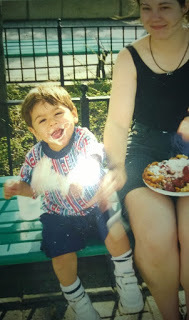
"I want to point the camera and smile at you."
When Jory (my oldest son) was five he would say this, wanting to use my camcorder to take a video of me. Even now, more than twenty years later, I hear the sentence in his sweet five-year-old voice.
I hear it in part because I have remembered it so often, holding it close the sound has yet to disappear from my memory. But also because that is still, more than twenty years later, who Jory is and how he likes to view the world.
From his earliest years, Jory has loved to see the world and the people in it as part of one connected movie. Everyone plays a part and is written in for a reason. Over the years he has grown this vision into something extraordinary. From being too bossy (he was the writer and director of his brothers, he was quite sure!) to being too laid back (whatever happens, happens and it's all groovy man) to fighting for his right to choose happiness even though the world is filled with war and hunger (he wrote about that HERE) to now, as a father of three and husband to one, he sees his role as all of the above and mixes it up as best he can.
He is writing and directing his story, but his story is not only his own and so he asks and allows the narratives of others to influence his. Not only that, he also reaches out and asks for help. Ideas. Collaboration.
This is how he sees the world: We are all here together experiencing this epic story and it is incumbent upon us to be both inclusive and decisive. Know your goal well and invite others to help you get there. Jory has a way of believing in his independence and responsibility while not shying away from reaching for support from others.
He loves to bring a team together and inspire everyone to share their strengths, ideas, and hard work - something he does well as a movie theater manager. (He misses it for sure! Movie theaters are still closed due to COVID-19.)
At the moment he's using his skill as a gatherer of community and support to help his family find a home.
They are not homeless. And in truth, they don't have to be homeless even if they can't quite find something before their current living situation disappears. However, family help options are slimmer than usual and not the forward motion he and his family are working toward. (A strange and wonderful shifting of places is happening everywhere in my family. It's exciting! But because we are all in this unique transition there is less reliable space to offer.)
The home he and his family are living in at the moment is my mom's home. However, it will no longer be hers by the end of the summer (which, by the way, is exciting! She and my brother Dar are embarking on an RV life adventure!) and so Jory, his wife, his daughters and soon-to-be born son are looking for something affordable in the area. Admittedly, they are happy to move away from the area if Jory can transfer to a Regal Cinema near a new home. But he truly does love his location and the people he works with.
And, as is Jory's beautiful way, he is reaching out and inviting us to play a role in this story!
He created a GoFundMe fundraiser, in hopes that the financial burden of first and last rent, rent applications, and moving in general, can be shared.
He and his wife are reaching out to everyone they know to ask for ideas, advice, and recommendations.
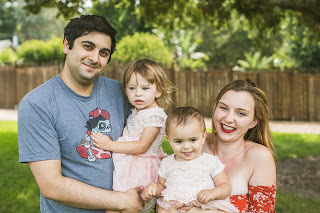 Jory's fundraiser: A Home for our Family
Jory's fundraiser: A Home for our Family Admittedly, they are nervous. Transitions tend to create anxiety even in the best and easiest of times, but when you are trying to find a home for your family and start on an unknown brand new journey (not only will this be the first time they live together as a family without other family members there to help, all the helpful family members are in transitions of their own and will likely be quite far away) the anxiety threatens to turn into full-blown paralyzing fear that leaves you sitting around hoping your mom will swoop in and fix everything. (Or, wait. Is that just me? Maybe I shouldn't have said that out loud. tee hee!)
Well, this is me - his mom - swooping in and not fixing everything but asking if you are able to play a role in this story and help us build something: a home for his family out of a community of characters that cares.
If you are able to contribute something financially, thank you! If you can share the fundraiser on your social media, or in an email to someone you know, thank you! If you have ideas, experience, thoughts that might help them find a safe place to live, thank you! They are hoping to stay in the Simi Valley, California area (again, that's where the Regal Jory works at is) but are happy to move elsewhere. This is an exciting time in their lives and beginning somewhere new could be part of the Universe's plan. It's hard to know. This movie is not yet at its end. And we are not unaware that creating something beautiful is always possible and not location dependant.
Regardless of whether or not you are able to take an action we can see, I trust you - who have read along - are playing a part in this story. And for that, I thank you!
In the words of five-year-old Jory:
"I want to point the camera and smile at you."
Hugs, smiles, and love!!
Autism Answers with Tsara Shelton (Facebook)
# # #
Link to Jory's GoFundMe: Fundraiser by Jory Shelton
If you want to email Jory with ideas or recommendations: jory1993@gmail.com
If you'd like to connect with him on Facebook: Jory Shelton
June 30, 2020
Autism Answer: Fort Building with Big Box Play
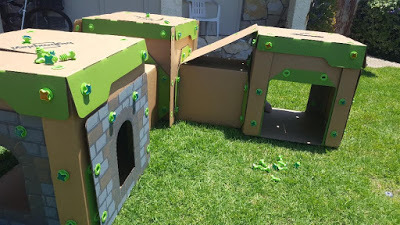
My oldest son, Jory, is famous among family and friends for being the most elaborate builder of forts. (He called them a "base") No furniture, blanket, or heavy item for holding things in place was overlooked when he was in base-building mode. He would take over the entire house building a base that had two floors, a tv room, a game room, you name it!
And now that he's a dad (two daughters and a son due in weeks!) his base building has grown into something equally as beautiful - connection building.
He connects with his kids and remains playful. Also, he uses all the furniture and we have nowhere to sit and sip coffee.
So it almost felt like coffee time in our family home was being offered a rescue when I was given an opportunity to try out a BigBoxPlay system! It's a cool fun way to build a base without using all the furniture and blankets! ;D
From Disabled World: "Disabled World was offered a BigBoxPlay for free from www.BigBoxPlay.com in consideration for an honest product review article. Like all review products Disabled World receives, the item was donated to a third party."
Insider Info: I was that third party!
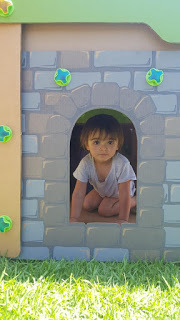 Simply Put: A Big Box Play modular system is a cardboard box style of fort building with previously prepared easy to build pieces and parts. It's meant for kids between the ages of 2 and 8 (my granddaughters are 2 and 3 so we were perfectly matched!) to have a little fun with building, playing, imagining, and creating.
Simply Put: A Big Box Play modular system is a cardboard box style of fort building with previously prepared easy to build pieces and parts. It's meant for kids between the ages of 2 and 8 (my granddaughters are 2 and 3 so we were perfectly matched!) to have a little fun with building, playing, imagining, and creating. I put it together - with a little help from the girls - according to the directions. And then my son, their dad, come along and got creative reusing and re-imagining a few parts and pieces to make something a little different. It was perfection! And precisely what the BigBoxPlay company encourages.
We have had the castle fort built for over a week now and it is still standing strong (despite having gotten a little wet from our sprinklers, we keep it outside) The girls like it, and so does the dog.
I offered to review the system and figured it would be nice to share my thoughts with you, too!
"BigBoxPlay is an indoor playhouse that you build with your children. My granddaughters (aged 2 and 3) and I chose to build it outside because, well, it is quite big! Hence, "Big" box play. ;D
My granddaughters are a bit young (and impatient) to help out much in the building process, but they did help. And we had fun. Mostly, though it was her dad and uncle and me that built it. It is fairly simple and modular. So when my sons decided to get a little creative with what went where, they were easily able to. Which resulted in a cardboard box style castle for my grandaughters that is custom made for them! The system is durable, fun, and can be decorated with crayons, stickers, paint, etc. (I drew a heart on it and my granddaughter got mad at me because it is her castle. giggle!)
It takes up a lot of space, so we keep ours outside. We were concerned that it wouldn't last since it is made out of cardboard, but the cardboard is surprisingly durable and it still stands strong! After a week of rough play and even getting a little wet from our sprinklers.
If you are looking for an indoor playhouse that can be built as a family, reimagined and reshaped, drawn or written on, and is likely to bring out the playful side of you, then I recommend BigBoxPlay!"
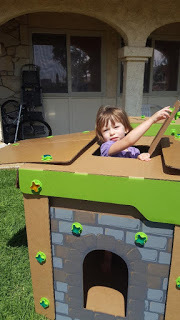 I'd like to add, as I think the Big Box Play website itself mentions, the tunnels and spaces inside the system are particularly attractive to kids who seek small spaces. This is common in children with sensory challenges and may offer a safe space to spend time in. Of course, it may not. I just felt it would be pertinent to mention.
I'd like to add, as I think the Big Box Play website itself mentions, the tunnels and spaces inside the system are particularly attractive to kids who seek small spaces. This is common in children with sensory challenges and may offer a safe space to spend time in. Of course, it may not. I just felt it would be pertinent to mention.So now we have a fort outside and our furniture is safe from Jory's base building. Coffee time in our family home is now complete with comfortable sitting space!
I hope you are able to do something similar with your kiddos this summer. Something hands-on and together, fun and creative, and something that protects your coffee time! ;D
I know we are all still in a strange place in the world. Things are uncommon and bringing up important but sensitive discussions and new ideas. In the meantime, we can get down with our kids and connect. No matter what happens, being connected with our children (I love doing it through play) will help us make the most of it. Build a fort, get inside, and play.
Hugs, smiles, and love!!!
Autism Answers with Tsara Shelton (Facebook)
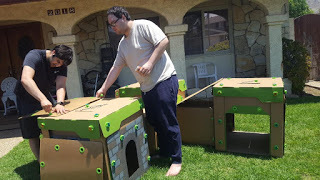
Link for BigBoxPlay
Link to all articles, news, and reviews on Disabled World
June 1, 2020
Autism Answer: COVID-19 In Small Town Texas - My Story
“I’m going to isolate myself in the back bedroom. I have a cough, slight fever, fatigue, headache, and I can’t breathe. It seems like I need to stay away.”
I said this to my husband as we drove back with his barbeque sandwich from the Texas town nearest our small Texas town.
For the next few days, I struggled with the cough, barely a fever, serious fatigue, headache, and shortness of breath. I did as I’d heard and read; stayed home and didn't go to a doctor or hospital, did my best to isolate, waited to see if my body could simply fight the illness on its own without spreading to others.
Obviously, I wondered if it was the novel coronavirus 19 but, regardless, I was sick and didn’t want to share that sickness.
However, after a few days (three, I think?) I was left with a cough, horrible shortness of breath, and fatigue, and I began to be scared. I couldn’t keep my eyes open, I felt like I was drowning. Also, my husband is nearly 70 years old and black - and it becomes necessary for him to visit and help our black family members, particularly the older ones, often - most of them specifically at risk, so I truly wondered if I needed to be more forceful with him about the isolation.
In a brief moment of awakeness I looked up the nearest COVID-19 testing center to me. According to my search, it was forty minutes away and I needed an appointment and/or recommendation from a doctor. I was so sick, honestly, that the thought exhausted me and I couldn’t do it. Isolate, social distance, wash my hands, wear a mask, these things are what they would tell me even if I did prove to be positive, so stay home and do that I told myself, passing out and struggling to breathe.
Two days later I was not worse but no better. I called the nearest hospital and asked for advice. “We can’t tell you what to do but we’re here, we’re here,” the woman said kindly.
I was so tired but not sleeping because I couldn’t breathe. I crawled back on my bed and silently cried.
The next day I asked my husband to take me to the E.R.
He took me immediately and when we got there they would not let him in, only the sick person. Me.
They asked me COVID questions, and I answered honestly. My cough was slight, my fever gone, my headache gone, but the fatigue and shortness of breath intense indeed. I had to lean against the wall to answer all of these questions.
When I was seen I answered the questions again, tried my best to be upbeat and friendly, not a suck but honest about my condition. They asked if I thought I had COVID and I answered honestly, “I don’t know but I think have something.”
Chest X-rays showed something small on my lungs, nothing shocking. My oxygen levels were good. We wondered if it was anxiety. I was pretty sure it was something else. “Bronchitis, maybe?” they decided and offered to give me a steroid shot. I was so sleepy and desperate for breath. “Yes, please, anything.”
I wondered why they didn’t test me for COVID, but was too unwell to think straight and ask. I had another moment of shock as they gave me my bill (I have insurance, but over $1,000.00 was left for me.)
When someone from the hospital’s hospitality department called me the next day to check on me, I asked. “Why didn’t they test me for COVID?”
“Well,” she replied, sort of hesitating, “we’re regulated by the state and they have strict rules about testing. We can’t test you unless you have all of the symptoms and we rule several other things out first.”
“Huh, okay. I just wondered because both my husband’s age and race make him particularly at risk. Anyway, thank you.”
Two days later I felt the same, no worse no better, and I called the local medical clinic and made an appointment to see a doctor.
Again, they would not let my husband inside and greeted all of us at the door with COVID specific questions. Again, I answered honestly and was asked to bring my circled paper to the receptionist, pointing out my symptoms as I signed myself in. I did that.
Eventually, after struggling to breathe and trying so hard to be upbeat and friendly, I was met by the doctor. I was immediately lucky enough to suddenly have a long moment of comparative comfort (this did keep happening over all the days of my illness, I would have waves of feeling fairly good and get oh so hopeful that finally I might feel better, only to have the wave crash down on me and bring me nearly to my knees with fatigue and a feeling of being unable to breathe).
Again, the doctor asked the questions and I answered honestly. After he listened and looked and measured, he agreed that maybe I had bronchitis or walking pneumonia. “I’d also like to test you for anemia if you don’t mind having labs done?”
“I’m happy to have lab work done. I’ll do almost anything just to feel better. Will you test me for COVID?”
“Well,” he began, “we’re regulated by the state. I can’t test you for COVID unless you meet so much criteria and until I rule out a whole bunch of other things. Even if I call them I’ll be on the phone for over an hour only to hear no.”
“Wow,” I said. “That’s not cool.”
He didn’t reply, but sent me on my way for lab work and promised to be in touch with results. He also prescribed steroids and antibiotics for bronchitis and pneumonia. (And I was gifted with another bill of nearly $600.00 - thank goodness they let you pay later at these places.)
Before I even picked up my meds, at the urging of my mother who had just easily gotten herself a test for COVID in California, I tried finding a testing center again.
This time I found one only 35 minutes away in a town I am familiar with. Something about how desperate I was to feel better had been stopping me from being able to do a better job of seeking help for myself, but this time I didn’t feel as overwhelmed and called to ask them if I could come in.
“Of course! Come on in! We’re open till 8PM. No need for an appointment, just bring your insurance.”
“Oh, wow! That was so easy. Everywhere else has shut me down.”
“Really?” she asked, sounding authentically surprised. “But, why?”
“Something about being regulated by the state.” I had a sudden crash of uneasy breathing and fatigue, so I quickly thanked her and hung up the phone.
The next day I showed up wearing my mask, coughing, and struggling for breath. They asked me to wait in my vehicle while doing my paperwork. They met me out there to first ask my symptoms, check my vitals, and swab me for flu and strep. Simple tests that were not fun for me but seemingly pretty easily done.
The flu test came back positive for flu A, I was negative for strep. Yay! I had the flu! Now I made a little more sense to me. Why on earth had nobody tested me for flu before this?
I waited a while and was met by a physician’s assistant who did the COVID-19 test. She asked questions and agreed with my doctor, only she had more information having done the flu test and sounded more certain, I had a flu, and now I probably also had atypical pneumonia and maybe bronchitis. I admitted to her that the doctor I had seen the day before said the same thing, prescribed medications for me but I had yet to pick them up. “Take the steroids and the antibiotics,” she said, looking at me with piercing eyes that cared. “If you don’t this will probably get worse. Tell me you’ll take them.”
“I will, I promise,” I said, almost shyly and slightly ashamed of being caught not taking care of myself.
I did as I was told: took my medicine and got better.
A few days later I got test results back. I was not anemic and I tested negative for COVID-19.
Okay, cool!
But boy did I wonder a few things.
Clearly, COVID is on the minds of every place I went with questions about my health and my similar to COVID symptoms. They were screening with specific to COVID questionnaires at all the entrances, not allowing anyone other than the patient or a minor patient’s guardian in because of COVID, yet they could not test me for COVID. Not until I somehow proved over and over that my illness was not other things. In the meantime I was given hefty bills to pay and a feeling that they didn’t think it was COVID (since I wasn’t tested). Also, it took several different medical locations before I was tested for the flu. Why?
The state seems to not want to know if I had COVID. My husband thinks they avoided testing me for the flu because there isn't enough money in it for them. I don't know about that, but I do know that I wasn't going to be tested for COVID-19 easily, even though I had several symptoms and was asking about it, so whatever the numbers are regarding COVID positive people in rural Texas, there's no way they're right. No way. We aren't tested unless we work at getting tested and it isn't as simple as going to our local hospital or clinic.
I was sick and admit I wasn’t the best advocate for myself. The energy it took to show up, answer their questions, was a lot. I did ask about the test, but didn’t push for it. I admit I didn’t feel I needed to know whether or not I had COVID I just needed to know what I did have. I knew I was sick, so I isolated, washed my hands, was a much better person regarding caring about not spreading my illness than I ever have been and I plan to be that way from now on (I am grateful for learning that during this strange time in the world. How my, “oh, I’m fine, I’m okay, I don’t have to be careful because I’m tough and rarely get sick but if I do I’ll handle it,” attitude was not just foolish for myself but putting others at risk.) but I do think that knowing the numbers of people who do have the virus is useful for the state.
A state that regulates the test into barely being used.
I'm glad I feel better, I'm glad I didn't have COVID which is a highly contagious selfish virus. But I only know that because I kept working at knowing it.
I did not need to be added to the COVID-19 positive people here in rural Texas, but how many of my neighbors did or do? It is really hard to know.
____________________
Autism Answers with Tsara Shelton (Facebook)
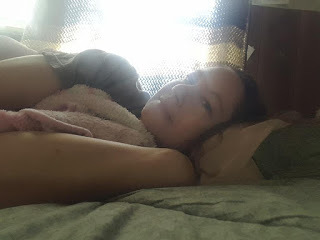 Image: Me laying in bed while sick and sleepy
Image: Me laying in bed while sick and sleepyMay 25, 2020
Autism Answer: In Service
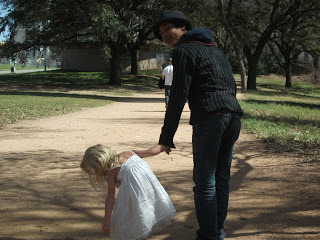 My youngest with my sister's youngest.
My youngest with my sister's youngest. Today is Memorial Day in the USA. Memorial Day is set aside to honor and remember those who have died while serving in the United States Armed Forces.
I confess, that while I have no struggle with honoring and remembering people, I am deeply uncomfortable with the United States Armed Forces.
However, it is easy for me to use this day as a refreshing of, and reflection on, my passion for honoring and remembering the value and complexities of being in service.
A desire to be in service, I suggest, is innate in all of us.
But too often we refuse it. Or when we choose it, it is by stepping into an oversized system that is built to simulate a sense of being in service. Those systems almost always include aspects and opportunities for true service but rarely are entirely holistic or sustainable when put to the test of their proposed mission.
But we do all have an ability and desire to be in service.
We can do this daily by being willing to inconvenience ourselves, divert from our scheduled plans, even put ourselves in danger, to take time with someone reaching out.
It is true that sometimes people don't reach out until they are in a dangerous state. It is true that sometimes we put ourselves in danger when choosing to meet them where they are and hope to guide them to somewhere healthy. In these cases, be careful. Ask for help yourself if you can. But on Memorial Day it serves us to remember that moving into danger to be of service can be heroic. Can be, if we are careful and aware of who we are risking our safety to help.
My youngest brother is highly capable now, compared to where he was only years ago, and that is because a) he works at it, has clear goals, and wants it b) he reaches out to me or my mom when he needs guidance, ideas, calming down and c) trusts we will help.
My mom and I rarely are too busy for him, even though we often are. And when we don't take the time to guide him out of his misery, it is always with a belief in his ability to do it himself, not pity or avoidance of him.
Memorial Day can be a day for us to be in service. As we remember and honor the fallen vets, we can reach out to a living disabled veteran, one struggling with addiction, P.T.S.D, depression, or mobility issues. This will serve us equal to, if not more than, them.
And reflect on how accessible we are. Every day, how accessible are we? How inclusive and accessible is the world around us?
Make changes, ask others to make changes.
This Memorial Day - honor and remember and give gratitude to the fallen vets, and everyone who finds ways to make being in service a lifestyle. We will all be fallen one day. Let's honor those who have fallen before us. Who have been heroes and livers of intentional inclusive lives in service to others.
And let's become a hero in service ourselves.
“We don’t grow sophisticated alone.” ~Dr. Lynette Louise (“The Brain Broad”)
Hugs, smiles, and love!!Autism Answers with Tsara Shelton (Facebook)

